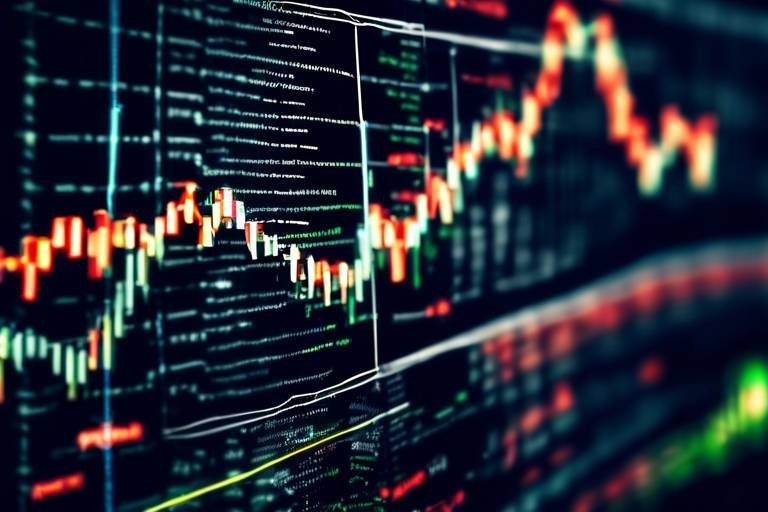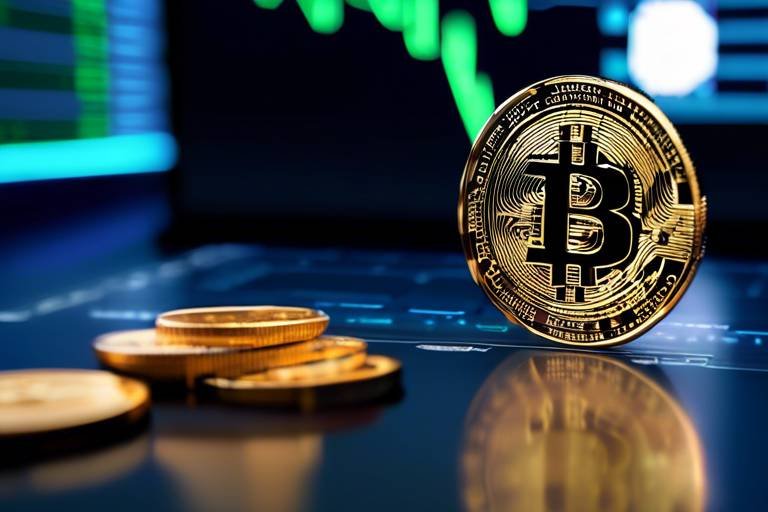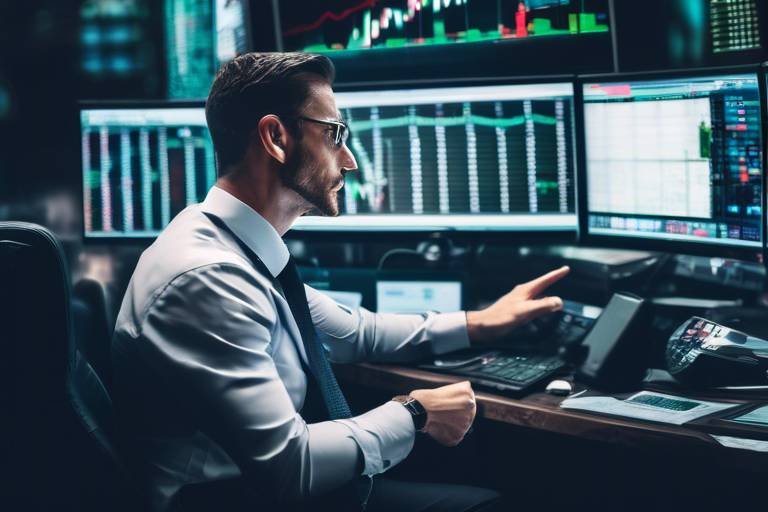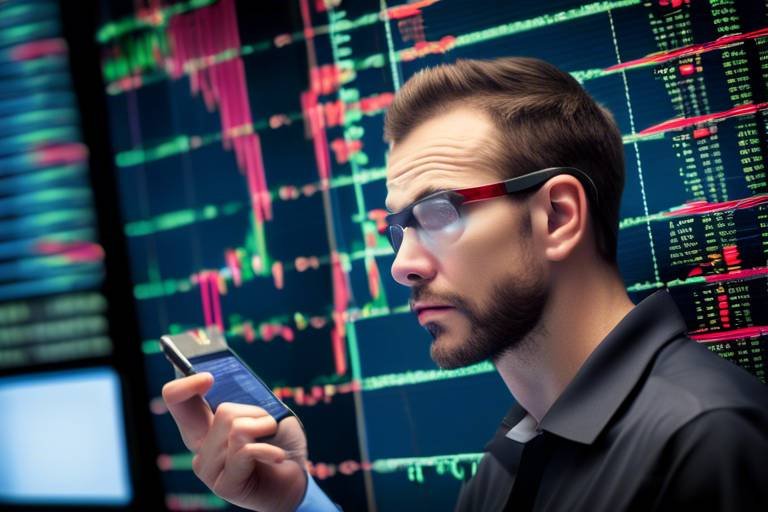The Psychology of Fear and Greed in Crypto Trading
In the thrilling world of cryptocurrency trading, emotions run high. The powerful forces of fear and greed not only shape our decisions but also dictate the market's pulse. These two emotions can be likened to a double-edged sword, capable of leading traders to both incredible gains and devastating losses. Understanding how fear and greed influence trading behavior is crucial for anyone looking to navigate the turbulent waters of this digital financial landscape.
Fear often creeps in during moments of uncertainty, causing traders to make hasty decisions that may not align with their long-term strategies. This emotional response can manifest in various ways, such as panic selling when prices drop or hesitating to invest when opportunities arise. On the flip side, greed can propel traders into risky territories, pushing them to chase after unrealistically high returns without considering the potential consequences. This article will explore these psychological dynamics, shedding light on their implications and providing strategies to manage them effectively.
Fear is a natural human emotion, but in the realm of crypto trading, it can lead to irrational decision-making. The psychological roots of fear often stem from a lack of understanding or experience in the market. When prices plummet, the instinctive reaction might be to sell off assets quickly, fearing further losses. This reaction often results in what is known as loss aversion, where the pain of losing is felt more intensely than the pleasure of gaining. In a market as volatile as cryptocurrency, this can create a vicious cycle of fear-driven decisions.
Moreover, the fear of missing out (FOMO) can exacerbate these feelings. As prices rise and others celebrate their gains, the fear of being left behind can compel traders to jump into the market without proper analysis. This behavior can lead to buying at the peak of a price surge, only to face significant losses when the market corrects itself. Recognizing these patterns is the first step towards overcoming fear in trading.
Greed is another powerful emotion that can cloud judgment in crypto trading. It often drives traders to take excessive risks, chasing after quick profits without considering the potential downsides. The allure of making a fortune can lead to impulsive decisions, such as investing in coins based solely on hype or speculation rather than thorough research.
When greed takes over, traders may ignore their established strategies and risk management principles. This can lead to significant losses, especially in a market that is as unpredictable as cryptocurrency. Understanding the psychological triggers behind greed can help traders develop a more disciplined approach, allowing them to make informed decisions rather than being swayed by emotion.
FOMO is a significant factor in crypto trading, pushing investors to act impulsively. The psychological triggers behind FOMO often stem from social influences, such as seeing friends or online communities celebrating their trading successes. This can create an overwhelming urge to join in, even if it means disregarding personal trading strategies.
Identifying specific situations that trigger FOMO can help traders manage their responses effectively. Common scenarios include:
- Watching social media influencers promoting a coin.
- Seeing a sudden price spike in a cryptocurrency.
- Hearing success stories from peers who have made significant gains.
Implementing effective strategies can mitigate FOMO's influence. Here are a few practical tips:
- Set Clear Goals: Define your trading objectives and stick to them.
- Limit Exposure: Reduce time spent on social media to minimize comparisons with others.
- Practice Mindfulness: Stay aware of your emotions and recognize when FOMO is influencing your decisions.
Emotional management is crucial for successful trading. Techniques such as setting stop-loss orders, maintaining a trading journal, and practicing regular self-reflection can help traders control fear and greed. By creating a structured approach, traders can enhance their overall performance and make decisions based on logic rather than emotion.
Market sentiment significantly affects trading behaviors. The collective emotions within the market can amplify individual fears and greed, shaping overall trading trends. When the sentiment is positive, traders may feel more confident and willing to take risks, while negative sentiment can lead to widespread panic and sell-offs.
Understanding market trends can provide insights into the prevailing sentiment. Traders can analyze various indicators, such as trading volume and price movements, to gauge whether market sentiment leans towards fear or greed. This analysis can help traders align their strategies with the broader market context, improving their chances of success.
Utilizing tools for emotional regulation can improve trading outcomes. Resources such as trading simulators, accountability partners, and educational courses can equip traders with the knowledge and skills needed to manage their emotions effectively. By fostering a disciplined trading mindset, traders can navigate the volatile crypto market with greater confidence.
1. How can I control my fear and greed in crypto trading?
Managing fear and greed requires self-awareness and discipline. Setting clear trading goals, maintaining a trading journal, and practicing mindfulness can help you stay focused and make informed decisions.
2. What is FOMO, and how does it affect trading?
FOMO, or the fear of missing out, is a psychological trigger that can lead traders to make impulsive decisions based on social influences or market hype. Recognizing FOMO triggers and implementing strategies to combat them can help maintain a disciplined approach to trading.
3. How does market sentiment impact trading decisions?
Market sentiment reflects the collective emotions of traders, which can influence individual trading behaviors. Understanding market trends and sentiment can help traders align their strategies with the broader market context.

Understanding Fear in Crypto Trading
Fear is a powerful emotion that can grip even the most seasoned traders in the crypto market. It’s like standing at the edge of a cliff, staring down into the abyss, unsure if you should leap or retreat. The **volatile nature** of cryptocurrencies can heighten this fear, leading to irrational decision-making that often results in significant losses. When prices plummet, traders may panic and sell off assets at a loss, driven by a primal instinct to avoid further pain. This reaction is not just about money; it taps into deeper psychological fears of failure and loss.
At its core, fear in trading stems from a few key psychological roots:
- Loss Aversion: This concept suggests that the pain of losing money is psychologically more impactful than the pleasure of gaining money. Traders often find themselves holding onto losing positions, hoping for a rebound, while they quickly sell off winning trades to lock in profits.
- Uncertainty: The crypto market is notorious for its unpredictability. This uncertainty can trigger anxiety, making traders hesitant to make decisions, which can lead to missed opportunities or panic selling.
- Social Pressure: In a landscape where everyone seems to be making money, the fear of falling behind can be overwhelming. This pressure can push traders to make hasty decisions, driven by the fear of being left out.
Moreover, fear can manifest in various ways during trading. For instance, the **fear of missing out (FOMO)** can compel traders to jump into a rally without proper research, while the fear of losing can lead to the opposite effect—holding onto a position out of sheer dread, even when the market signals a sell. This emotional rollercoaster can create a toxic cycle that undermines a trader's strategy and effectiveness.
Understanding these emotional triggers is crucial for any trader looking to navigate the complex waters of the crypto market. By recognizing when fear is influencing their decisions, traders can take a step back and reassess their strategies. This self-awareness can be the difference between a calculated risk and a reckless gamble. In the end, managing fear is not about eliminating it entirely, but rather learning to coexist with it, using it as a tool for better decision-making.
In summary, fear is an inherent part of the trading experience, particularly in the unpredictable world of cryptocurrencies. By understanding its psychological roots and manifestations, traders can develop strategies to manage their emotions effectively, leading to more informed and rational trading decisions.

The Role of Greed in Investment Decisions
Greed is often seen as a double-edged sword in the world of trading, especially in the volatile realm of cryptocurrencies. On one hand, it can serve as a powerful motivator, driving traders to seek out opportunities and push their limits. On the other hand, unchecked greed can lead to reckless decisions and devastating losses. It's essential to understand how this emotion influences our investment choices and the potential consequences that can arise from it.
At its core, greed is the intense desire for more—more profits, more success, and more recognition. In the fast-paced crypto market, where fortunes can change overnight, this desire can become overwhelming. Traders may find themselves caught in a cycle of chasing gains, often leading them to make impulsive decisions without fully considering the risks involved. For instance, a trader might see a coin skyrocketing in value and jump in without any research, simply because they fear missing out on potential profits.
Greed can manifest in various ways during trading:
- Over-leveraging: Many traders, driven by the allure of quick profits, may use excessive leverage to amplify their positions. While this can lead to larger gains, it also increases the risk of significant losses.
- Holding Positions Too Long: Greed can make traders reluctant to sell their assets, even when market indicators suggest it's time to cash out. This can result in missed opportunities and losses as the market shifts.
- Ignoring Stop-Loss Orders: Some traders may choose to ignore their stop-loss orders, believing that the market will turn in their favor. This decision, fueled by greed, can lead to devastating financial consequences.
Understanding the psychological underpinnings of greed is crucial for any trader looking to navigate the crypto landscape effectively. Greed often stems from a fear of loss—specifically, the fear of missing out on potential profits. This fear can create a sense of urgency that clouds judgment, leading to decisions that prioritize immediate gains over long-term strategy.
Moreover, the impact of greed is not limited to individual traders. It can also affect market dynamics as a whole. When traders collectively succumb to greed, it can create bubbles where asset prices inflate beyond their intrinsic value. This phenomenon was evident during the 2017 crypto boom, where irrational exuberance led to unsustainable price levels and, eventually, a significant market correction.
To combat the negative effects of greed, traders must develop a disciplined approach to investing. This involves setting clear goals, establishing risk management strategies, and sticking to a well-thought-out trading plan. By recognizing the signs of greed and implementing strategies to mitigate its influence, traders can enhance their decision-making processes and improve their overall trading performance.
In summary, while greed can be a powerful motivator in the world of crypto trading, it is essential to approach it with caution. By understanding its psychological roots and implementing effective strategies to manage it, traders can navigate the complexities of the market with greater confidence and success.

Fear of Missing Out (FOMO)
The Fear of Missing Out, commonly known as FOMO, is a powerful psychological phenomenon that grips many crypto traders. In a market as volatile and rapidly changing as cryptocurrency, FOMO can lead to impulsive decisions that often result in substantial financial losses. Imagine standing at a party where everyone is having a great time, dancing, and enjoying themselves. You’re outside, and the music is calling you in, but you hesitate, fearing you might miss something incredible. This is what FOMO feels like in the trading world—an overwhelming urge to jump in, often without proper analysis or strategy, just to avoid missing out on potential gains.
FOMO is particularly pronounced in the crypto market due to the nature of social media and online trading platforms. One moment, a coin is soaring to new heights, and the next, your friends are sharing their success stories, showcasing their profits. This creates a sense of urgency that can cloud judgment. Traders might think, “If I don’t act now, I’ll miss the boat!” This thought process can lead to hasty investments, where individuals buy into a coin at its peak, only to watch it plummet shortly after. The emotional rollercoaster that follows can be devastating, leading to a cycle of anxiety and regret.
Understanding the triggers of FOMO is essential for any trader looking to maintain a level head in the chaotic world of crypto. Common scenarios that trigger FOMO include:
- Seeing rapid price increases of a cryptocurrency.
- Hearing about friends or influencers making significant profits.
- Participating in online discussions that hype up certain coins.
- Noticing sudden market movements or trends.
These triggers can create a perfect storm, causing traders to act on impulse rather than logic. It’s crucial to recognize these moments and remind oneself that the market is not going anywhere. Taking a step back and evaluating the situation can often reveal that the fear of missing out is just that—a fear. By adopting a more analytical approach, traders can make informed decisions rather than emotional ones.
To combat FOMO effectively, traders can implement several strategies. First and foremost, setting clear goals and sticking to a well-defined trading plan can help mitigate the impulsive behaviors associated with FOMO. Additionally, practicing mindfulness and emotional awareness can empower traders to recognize when they are being driven by fear rather than sound trading principles. By creating a disciplined trading routine, individuals can reduce the emotional highs and lows that come with FOMO.
In conclusion, while FOMO is a natural human emotion, it’s essential for crypto traders to be aware of its influence and take proactive steps to manage it. By understanding the psychological triggers and employing effective strategies, traders can navigate the tumultuous waters of the cryptocurrency market with greater confidence and less emotional turmoil.

Recognizing FOMO Triggers
In the fast-paced world of crypto trading, recognizing the triggers of Fear of Missing Out (FOMO) is crucial for maintaining a balanced mindset. FOMO often creeps in when traders see others making significant profits, leading to impulsive decisions that can derail even the most well-thought-out strategies. One of the primary triggers is the rapid price movements that characterize the crypto market. When a coin’s price skyrockets seemingly overnight, it’s easy to feel the pressure to jump in before it’s too late. This emotional response can cloud judgment and lead to hasty investments.
Another common trigger is the influence of social media and news outlets. Platforms like Twitter and Reddit can create a buzz around certain cryptocurrencies, causing traders to feel as though they must act immediately to capitalize on the hype. The constant stream of information can be overwhelming, and distinguishing between genuine opportunities and mere speculation becomes increasingly difficult. Moreover, the fear of being left behind—watching friends or online acquaintances profit while you hesitate—can amplify these feelings, making it even more challenging to stick to a personal trading plan.
Additionally, market trends play a significant role in triggering FOMO. When a particular cryptocurrency begins to trend upward, the collective excitement can create a sense of urgency. It’s essential to recognize that this emotional wave can lead to herd behavior, where traders flock to buy, often without conducting proper research. This behavior not only fuels the FOMO cycle but also contributes to market volatility, making it a double-edged sword for traders.
To effectively manage FOMO, it’s beneficial to identify these triggers early on. By understanding what causes these feelings, traders can develop strategies to counteract them. For instance, setting clear investment criteria and adhering to them can help mitigate the impact of sudden market shifts. Additionally, taking a step back and evaluating the situation from a rational perspective can provide clarity. Ask yourself: “Am I making this decision based on solid analysis or just reacting to the fear of missing out?”
In conclusion, recognizing FOMO triggers is a vital skill for any crypto trader. By being aware of the psychological factors at play and implementing strategies to combat them, traders can maintain a more disciplined approach, ultimately leading to better investment outcomes.
- What is FOMO in crypto trading?
FOMO, or Fear of Missing Out, is the anxiety that traders feel when they believe they are missing a profitable opportunity, often leading to impulsive buying decisions. - How can I manage FOMO?
To manage FOMO, set clear investment goals, stick to your trading plan, and take time to analyze market conditions before making decisions. - What are common triggers for FOMO?
Common triggers include rapid price increases, social media hype, and market trends that create a sense of urgency to act.

Strategies to Combat FOMO
Fear of Missing Out, or FOMO, can be a trader's worst enemy, especially in the fast-paced world of cryptocurrency. The emotional rush that comes from seeing others make profits can drive even the most rational investors to act impulsively. So, how can you combat this overwhelming urge to jump into trades without a solid plan? Here are some effective strategies that can help you regain control and make informed decisions.
First and foremost, setting clear goals is essential. Before you even think about entering the market, take the time to define what you want to achieve. Ask yourself questions like, "What is my target profit?" and "What is my risk tolerance?" Having a well-defined plan gives you a roadmap to follow, making it easier to resist the temptation of FOMO when the market starts to surge.
Another effective strategy is to stick to your trading plan. Once you have established your goals and criteria for trading, it’s crucial to adhere to them. This means not deviating from your strategy just because you see others making quick gains. A disciplined approach can help you avoid the pitfalls of emotional trading. Remember, the market is full of noise, and it’s easy to get swept away by the hype. Stay focused on your plan!
Additionally, consider the power of mindfulness and self-awareness. Taking a step back to assess your emotional state can be incredibly beneficial. When you feel that urge to jump into a trade, pause for a moment and ask yourself why you feel that way. Are you reacting to market hype, or is it based on sound analysis? Practicing mindfulness techniques, such as meditation or deep breathing, can help you maintain emotional balance and clarity.
Moreover, utilizing stop-loss orders can provide a safety net when volatility strikes. By setting predetermined exit points, you can limit potential losses and reduce the emotional burden of decision-making in the heat of the moment. This strategy can be a game-changer, allowing you to trade with greater confidence and less anxiety.
Finally, it’s essential to educate yourself continuously. The more you know about the cryptocurrency market, the better equipped you'll be to make informed decisions. Join online communities, read articles, and follow reputable sources to stay updated on market trends and analysis. Knowledge is power, and it can help you resist the FOMO trap by grounding your decisions in facts rather than emotions.
In summary, combating FOMO requires a combination of clear goal-setting, discipline, mindfulness, risk management, and continuous education. By implementing these strategies, you can navigate the volatile crypto market with confidence and make decisions that align with your long-term objectives, rather than succumbing to fleeting emotions.
- What is FOMO in crypto trading? FOMO refers to the fear of missing out on profitable trades, which can lead to impulsive decisions.
- How can I manage my emotions while trading? Techniques such as mindfulness, setting clear goals, and using stop-loss orders can help manage emotions effectively.
- Is it possible to eliminate FOMO completely? While it may not be possible to eliminate FOMO entirely, you can reduce its impact by following a disciplined trading strategy.
- What role does education play in combatting FOMO? Continuous education helps traders make informed decisions based on analysis rather than emotions, reducing the likelihood of FOMO.

Managing Emotions in Trading
When it comes to trading, especially in the unpredictable world of cryptocurrency, managing your emotions is not just a nice-to-have; it’s a necessity. Think of your emotions as the weather: sometimes it’s sunny and bright, while other times it’s stormy and chaotic. Just as you wouldn’t go out without checking the forecast, you shouldn’t dive into trading without understanding your emotional landscape. The key to successful trading lies in recognizing and regulating these feelings, primarily fear and greed, which can cloud your judgment and lead to rash decisions.
One effective way to manage emotions is by developing a solid trading plan. A well-structured plan acts like a roadmap, guiding you through the highs and lows of the market. It should outline your goals, risk tolerance, and specific strategies for entering and exiting trades. By adhering to this plan, you create a framework that helps you stay grounded, making it easier to resist the temptation to react impulsively to market fluctuations. For instance, if you have predetermined stop-loss levels, you’re less likely to panic when prices drop suddenly.
Another technique is to incorporate mindfulness practices into your trading routine. Mindfulness encourages you to stay present and aware of your thoughts and feelings without judgment. This can significantly reduce anxiety and help you maintain clarity during volatile market conditions. Simple practices like deep breathing or short meditation sessions can help you reset your mind and focus on your trading strategy rather than your emotional responses.
Additionally, keeping a trading journal can be a powerful tool for emotional regulation. Documenting not just your trades, but also your feelings and thoughts during each trade can provide invaluable insights. Over time, you’ll begin to notice patterns in your emotional responses and how they correlate with your trading decisions. By identifying these patterns, you can work on strategies to mitigate negative emotional influences. For example, if you realize that fear often leads you to exit trades too early, you can develop techniques to counteract that fear.
Moreover, it’s crucial to surround yourself with a supportive community. Engaging with fellow traders can offer not only practical advice but also emotional support. Sharing experiences and strategies can help normalize the ups and downs of trading, reminding you that you’re not alone in facing these challenges. Online forums, social media groups, and local meetups can be great resources for finding like-minded individuals who understand the emotional rollercoaster that trading can be.
Finally, consider setting aside time for self-reflection. Regularly assessing your emotional state and how it impacts your trading can lead to greater self-awareness and better decision-making. Ask yourself questions like: “How did I feel during my last trade?” or “Did my emotions influence my decisions?” This self-examination can help you identify areas for improvement and reinforce positive trading habits.
In summary, managing emotions in trading is about creating a balanced approach that combines planning, mindfulness, community support, and self-reflection. By integrating these strategies into your trading routine, you can enhance your emotional resilience, making you a more disciplined and successful trader in the long run.
- How can I stay calm during market volatility? Focus on your trading plan and practice mindfulness techniques like deep breathing.
- What should I include in my trading journal? Record your trades, emotions, and the reasoning behind your decisions to identify patterns.
- Is it beneficial to talk to other traders? Absolutely! Sharing experiences can provide support and new perspectives.
- How often should I reflect on my trading emotions? Regular self-reflection, such as weekly or monthly, can help you stay aware of your emotional state.

The Impact of Market Sentiment
Market sentiment plays a crucial role in the world of crypto trading, acting as the invisible hand that guides the decisions of countless traders. It’s fascinating how collective emotions can ripple through the market, creating waves of fear and greed that can lead to significant price fluctuations. When sentiment is high, traders often feel invincible, driving prices up as they scramble to buy into the next big opportunity. Conversely, when fear grips the market, panic selling can ensue, leading to rapid declines in value. This emotional rollercoaster can leave even the most seasoned traders feeling dizzy and uncertain.
Understanding market sentiment is not just about gauging whether traders are feeling optimistic or pessimistic; it’s about recognizing how these emotions influence trading behavior. For instance, during a bull market, the excitement can create a herd mentality where everyone rushes to invest, driven by the fear of missing out (FOMO). On the other hand, in a bear market, negative sentiment can lead to a self-fulfilling prophecy where traders sell en masse, further driving prices down. This phenomenon illustrates just how powerful emotions can be in shaping market dynamics.
To gain insights into market sentiment, traders often turn to various indicators and tools. These can include:
- Social Media Trends: Monitoring platforms like Twitter and Reddit can provide real-time insights into public sentiment surrounding a particular cryptocurrency.
- Fear and Greed Index: This index quantifies market sentiment by analyzing various factors such as volatility, market momentum, and social media trends.
- Trading Volume: A surge in trading volume can indicate heightened interest and bullish sentiment, while a decline may signal fear and uncertainty.
Moreover, traders can utilize sentiment analysis tools that aggregate data from multiple sources to provide a clearer picture of the prevailing market mood. By understanding these sentiments, traders can make more informed decisions, potentially avoiding the pitfalls of emotional trading.
In essence, the impact of market sentiment cannot be overstated. It shapes the very fabric of trading behavior and influences price movements in ways that are often unpredictable. As traders navigate this volatile landscape, developing an awareness of market sentiment can be a game-changer. It empowers them to anticipate potential shifts in the market, allowing for more strategic decision-making. Ultimately, recognizing the emotional undercurrents at play can help traders maintain their composure, enabling them to thrive even in the most turbulent of times.
- What is market sentiment? Market sentiment refers to the overall attitude of investors toward a particular security or financial market. It can be influenced by news, events, and the general mood of traders.
- How can I gauge market sentiment? You can gauge market sentiment by analyzing social media trends, using sentiment analysis tools, and observing trading volumes and price movements.
- Why is understanding market sentiment important in crypto trading? Understanding market sentiment helps traders anticipate price movements, avoid emotional trading decisions, and make more informed investment choices.

Analyzing Market Trends
When it comes to crypto trading, understanding market trends is like having a compass in a dense forest. Just as a compass guides you through uncertainty, analyzing trends can help you navigate the turbulent waters of the crypto market. But how do you effectively analyze these trends? It all starts with recognizing that market movements are rarely random; they are influenced by a myriad of factors, including trader sentiment, news events, and technological advancements.
One of the first steps in analyzing market trends is to look at historical price data. By examining past price movements, traders can identify patterns that may repeat in the future. For instance, many traders utilize technical analysis tools like moving averages, Relative Strength Index (RSI), and Bollinger Bands to predict future price movements based on historical data. These tools help in determining whether a market is in a bullish or bearish phase, allowing traders to make informed decisions.
Moreover, it's crucial to consider market sentiment, which can often amplify the effects of fear and greed. Sentiment analysis involves gauging the mood of the market—are traders feeling optimistic or pessimistic? This can be assessed through various means such as social media trends, news articles, and even sentiment indicators like the Fear and Greed Index. For example, during a market rally, you might notice an influx of positive news and social media chatter, which can further drive prices up. Conversely, negative news can create a panic sell-off, leading to significant price drops.
To illustrate the importance of market sentiment, consider the following table that highlights how different news events can impact crypto prices:
| News Event | Market Reaction |
|---|---|
| Regulatory Approval | Price Surge |
| Major Exchange Hack | Price Drop |
| Institutional Investment | Price Surge |
| Market Crash | Panic Selling |
Additionally, traders should keep an eye on volume, which indicates how much of a particular asset is being traded. High trading volume often confirms a trend, while low volume may suggest a lack of conviction in the market direction. For example, if Bitcoin's price is rising rapidly but the trading volume is low, it may be a sign that the upward trend is not sustainable and could reverse soon.
In summary, analyzing market trends is not just about looking at numbers; it's about understanding the psychology behind those numbers. By combining technical analysis, market sentiment, and trading volume, traders can develop a comprehensive view of the market. This holistic approach allows for better decision-making and can help mitigate the emotional pitfalls of fear and greed that often plague traders. So, the next time you're about to make a trade, take a moment to analyze the market trends—your wallet will thank you!
- What is the best way to analyze market trends?
The best way to analyze market trends is by using a combination of technical analysis tools, market sentiment indicators, and trading volume data.
- How can I avoid being influenced by fear and greed?
Implementing strict trading strategies, setting stop-loss orders, and maintaining a disciplined approach can help you avoid emotional trading influenced by fear and greed.
- What role does news play in market trends?
News events can significantly impact market trends, causing rapid price changes based on trader sentiment and reactions to the information presented.

Tools for Emotional Regulation
When it comes to trading cryptocurrencies, the emotional rollercoaster can be overwhelming. Fear and greed can cloud your judgment, leading to impulsive decisions that could jeopardize your investments. So, how can you keep your cool amidst the chaos? Fortunately, there are several effective tools for emotional regulation that can help you maintain a level head and make informed choices.
One of the most powerful tools at your disposal is mindfulness meditation. This practice encourages you to focus on the present moment, helping you detach from the emotional highs and lows of trading. By incorporating just a few minutes of mindfulness into your daily routine, you can cultivate a sense of calm and clarity, allowing you to approach trading decisions with a more rational mindset.
Another useful technique is the use of trading journals. Keeping a detailed record of your trades, including the emotions you experienced during each decision-making process, can provide invaluable insights. By reviewing your journal regularly, you can identify patterns in your emotional responses and develop strategies to counteract negative feelings in the future. This self-awareness can be a game-changer in your trading journey.
Additionally, consider utilizing visualization techniques. Imagine yourself navigating through the ups and downs of the market with confidence and composure. Visualizing successful trading scenarios can reinforce positive behaviors and help you stay focused during times of stress. Just like an athlete visualizes winning a race, you can visualize making sound trading decisions, which can boost your confidence and reduce anxiety.
Moreover, leveraging technology can also enhance your emotional regulation. There are numerous apps designed to help traders manage their emotions, offering features such as real-time alerts, market analysis, and even guided meditation sessions. These tools can provide the support you need to stay grounded, especially in a fast-paced environment like crypto trading.
Lastly, don't underestimate the power of community. Engaging with fellow traders through forums or social media can create a support network where you can share experiences and strategies for emotional regulation. Sometimes, just knowing that others face similar challenges can alleviate feelings of isolation and fear.
In conclusion, the key to successful trading lies not just in understanding market trends but also in managing your emotions. By employing tools like mindfulness meditation, trading journals, visualization, technology, and community support, you can navigate the turbulent waters of crypto trading with greater ease and confidence. Remember, maintaining emotional balance is not just an option; it's a necessity for long-term success in this volatile market.
- What is emotional regulation in trading? Emotional regulation in trading refers to the ability to manage and respond to emotions like fear and greed effectively, ensuring that these feelings do not negatively impact trading decisions.
- How can mindfulness help in trading? Mindfulness can help traders stay present and focused, reducing anxiety and impulsive decisions driven by emotional reactions to market fluctuations.
- What is a trading journal? A trading journal is a record where traders log their trades, including the rationale behind their decisions and the emotions they felt, which helps in identifying patterns and improving future trading strategies.
- Can technology assist with emotional regulation? Yes, various apps and tools can provide real-time market insights, alerts, and even mindfulness exercises to help traders maintain emotional balance.
- Why is community important for traders? Engaging with a community of traders can provide support, shared experiences, and strategies for managing emotions, helping to combat feelings of isolation and fear.
Frequently Asked Questions
- What is the psychology behind fear in crypto trading?
Fear in crypto trading often stems from the volatility of the market. Traders may panic when prices drop, leading to irrational decisions like selling off assets at a loss. Understanding this fear can help traders develop a more rational approach to their investments.
- How does greed affect trading behavior?
Greed can push traders to take unnecessary risks, such as investing more than they can afford to lose. This emotion can cloud judgment and lead to poor decision-making, ultimately resulting in significant financial losses.
- What is FOMO, and how does it impact trading?
FOMO, or the Fear of Missing Out, is a powerful emotion that drives traders to act impulsively, often leading to hasty investments. This can result in buying at peak prices without proper analysis, making it crucial for traders to recognize and manage this feeling.
- How can I recognize my FOMO triggers?
Identifying FOMO triggers involves reflecting on past trading experiences and recognizing patterns that lead to impulsive decisions. Common triggers include social media hype, sudden market movements, or news events that create a sense of urgency.
- What strategies can help combat FOMO?
To combat FOMO, traders can set clear investment goals, stick to a trading plan, and practice patience. Techniques like mindfulness and journaling can also help traders maintain discipline and make informed decisions rather than succumbing to emotional impulses.
- Why is emotional management important in trading?
Emotional management is vital in trading because it helps traders maintain clarity and focus, reducing the likelihood of making impulsive decisions based on fear or greed. By controlling emotions, traders can enhance their overall performance and make more rational choices.
- How does market sentiment influence trading decisions?
Market sentiment, which reflects the collective emotions of traders, can significantly influence individual trading decisions. When sentiment is high, traders may feel more confident and take risks, while negative sentiment can lead to panic selling.
- What tools can help with emotional regulation in trading?
Several tools can assist with emotional regulation, including trading journals, performance tracking apps, and market analysis tools. Additionally, techniques such as meditation and breathing exercises can help traders maintain emotional balance during market fluctuations.



















